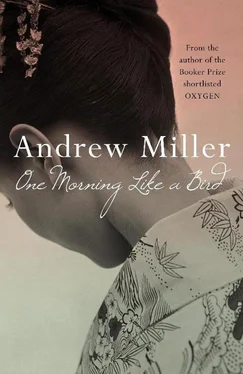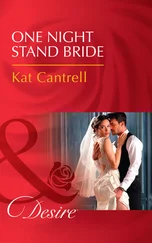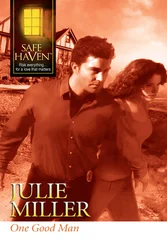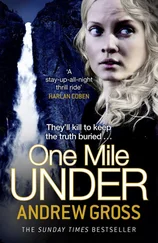‘You think they’re not true?’
‘True?’
‘The stories?’
She shakes her head. ‘I have to go in,’ she says. ‘I have to go in now.’
‘You’ll be needing this,’ he says, taking the crutch from where Otaki has left it propped against the gate. He hands it to her as tenderly as he can, as though it was a spray of plum blossom. She thanks him, clutches it across her breasts, and scurries inside.
‘What did he want?’ asks Father, coming from his room and stopping Yuji at the top of the stairs the following morning.
‘I don’t know,’ says Yuji. ‘He was drunk.’
‘I see,’ says Father, ‘Hmm.’
Yuji waits. Is that it? Can he go? He does not want to repeat what he has heard, to say (standing in the morning shadows at the top of the stairs) that their neighbour is an expert in decapitation, or that Japanese doctors in China behave like the criminally insane. Whatever Kyoko might wish to think he is sure the stories are true. Saburo hasn’t the imagination to invent such things.
‘He’s brought it back with him,’ says Father.
‘What?’
‘The war.’
‘Yes.’
‘I pity him.’
‘Yes.’
‘I never liked him, but even so.’
‘Yes, even so.’
‘To lose both parents while still a child. A hard beginning.’
‘When you were in the army, Father . .’
‘It was 1913. There was no war.’
‘I know. But what did you do?’
‘Tried not to die of boredom.’
‘That’s all?’
‘Studied when I could. Played a lot of shogi .’
‘It wasn’t so bad, then?’
‘Stay on the right side of Kushida, Yuji. I’ll do what I can.’
‘Thank you.’
‘Ishihara’s group. Can they help you? I imagine they have better connections than I do. Now, at least.’
‘You would approve of me accepting their help?’
Father starts down the stairs. ‘I might,’ he says over his shoulder, ‘prefer it to having you howl in the street at night. Your mother certainly would.’
The money from Hideo Makiyama has dwindled to a handful of small change. The screenplay, which one day might bring him a hundred yen or more, is just a single sheet of paper with a single unfilmable scene about a boy flying to the heart of the sun. The last handout from Grandfather went on new boots for the coming winter. As for the banknotes Uncle Kensuke pressed into his hand at the station, he cannot account for them at all. Books? Beer?
It is time to see old Horikawa again, to sit at the window, look at trains and drink coffee. After his efforts to write ‘something exalted, something delirious’ he should have no difficulty scratching a few lines in praise of shipping companies or toothpaste. He sets off for Hibaya, cool early October sunshine on the back of his neck, but when he reaches the building and walks up the broken wax tiling of the stairs, the office door is shut and locked. There is no sign on it, no ‘Back in an hour’ or ‘Closed for reasons of ill health’. He goes down to the repair shop, calls a greeting, steps inside. The shop is a nest, a densely packed hive of bicycles — new, old, wheels on, wheels off. They even hang from the ceiling, clusters of them suspended from hooks. He calls again, gets no reply. The concrete floor is dotted with flowers of oil. Behind a curtain at the back of the shop, an infant is wailing, methodically. He goes back upstairs, writes a note on a scrap of paper and slips it under the door, then, with nothing better to do, he eats under the railway line, an elbow-to-elbow place where every time a train rumbles overhead the surface of his broth breaks into delicate ripples.
After eating (and it’s true what Kushida said, his appetite is better these days, he is healthier, so much so he has once or twice seriously considered taking up smoking), he walks to the park and squats on a grass bank beneath a maple tree to read the paper. The delegation who signed the pact in Berlin have arrived home. Prince Konoe and senior members of the government have expressed their gratitude. The Fifth Division has entered Hanoi. The people there have welcomed them as elder brothers, though in the photographs the people are just shapes in the margin, out of focus. The back page of the paper shows a woman modelling the new monpe trousers at the Matsuya department store. The trousers are a synthesis of fashion and the national will. They are elegant, perfectly modest, but leave the legs free for the physical labour all sections of society must now be prepared to take part in . .
He folds the paper, discards it at the first bench he passes, and returns to the building. The office is still locked, and now, downstairs, the steel grille of the repair shop is shut and chained. Is there some local holiday? A neighbourhood kami of good profits, a Buddha of low taxes to be venerated? He looks at his watch. Almost half past three. On Tuesday afternoons the Montparnasse in Asakusa shows half-price double-bills of British, French or American films. If he can get there in time, then the day will not have been wasted. He scribbles another note to Horikawa, hurries to the stop opposite the Imperial Theatre, takes a cross-town bus to the Kannon Temple, then jogs the 500 yards to the cinema.
‘Make the most of it,’ says Mr Suzuki, the manager of the Montparnasse, sitting in his white suit in the ticket booth. ‘From now on I’m just showing jidaigeki pictures. Noble warriors, women with no eyebrows, lovely costumes . .’
‘Haven’t you said that before?’ asks Yuji, wheezing from his run, and looking past the manager’s head at the posters for Stagecoach and Pépé le Moko .
‘I mean it,’ says the manager, snipping Yuji’s ticket from the roll. ‘This foreign stuff will get me shut down. Or worse. The next time you see me I’ll have a samourai topknot. You’ll think I’m one of the Forty-seven Ronin.’
In the little auditorium thirty, perhaps forty customers are waiting on seats of frayed green plush. A few couples, but mostly men on their own, amateurs of cinema — some in uniform — who find at the Montparnasse what the sushi tsu find at Kawashima’s. Yuji takes a seat at the end of a row halfway back. There is a short wait while Suzuki moves from the ticket booth to the projection room (they can hear his footsteps, his weary tread on the stairs), then the newsreel begins — trumpets, eagles, a spinning globe. They stand for the Emperor, sit again, polish glasses, light cigarettes, and bend towards the screen, lean like divers at the edge of a glittering pool.
Three hours later, sated, they file outside, blinking in the blue and gold of early evening. Yuji loiters at the kerb, his atoms dispersed between the deserts of New Mexico and the labyrinth of the Kasbah. He is staring, with vacant intensity, at a board outside the confectionary shop on the other side of the narrow street. There is a painting on the board of the seasonal delicacy ‘autumn comes to the treetops’, and he is wondering what Ringo Kid — a man who gallops through treeless landscapes — might make of such a delicacy (would he buy some for a sweetheart?), when a customer, a woman, a slight figure in a blue and white kimono, comes out of the shop and stops directly opposite him.
‘Mr Takano?’
‘Mrs Yamaguchi!’
‘What a surprise to see you here.’
Students on bicycles glide between them, then two taxis full of young geishas, shamisen cases on their laps. He crosses the street. She waits for him, neat as a doll, in her hands a box of sweets wrapped in paper decorated with autumn flowers — dahlias, amaranths.
‘I was at the cinema,’ says Yuji.
Читать дальше












